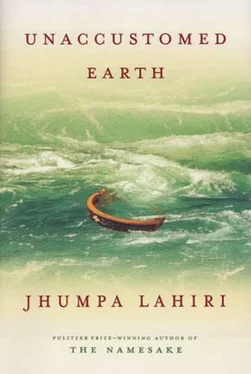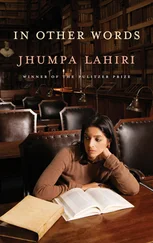I did not know what to make of you. Because you'd lived in India, I associated you more with my parents than with me. And yet you were unlike my cousins in Calcutta, who seemed so innocent and obedient when I visited them, asking questions about my life in America as if it were the moon, astonished by every detail. You were not curious about me in the least. One day a friend at school invited me to see The Empire Strikes Back on a Saturday afternoon. My mother said that I could go, but only if you were invited as well. I protested, telling her that my friend did not know you. Despite my crush, I didn't want to have to explain to my friend who you were and why you were living in our house.
"You know him," my mother said.
"But he doesn't even like me," I complained.
"Of course he likes you," my mother said, blind to the full implication of what I'd said. "He's adjusting, Hema. It's something you've never had to go through."
The conversation ended there. As it turned out, you were uninterested in the movie, not having seen Star Wars in the first place.
One day I found you sitting at my piano, randomly striking the keys with your index finger. You stood up when you saw me and retreated to the couch.
"Do you hate it here?" I asked.
"I liked living in India," you said. I did not betray my opinion, that I found trips to India dull, that I didn't like the geckos that clung to the walls in the evenings, poking in and out of the fluorescent light fixtures, or the giant cockroaches that sometimes watched me as I bathed. I didn't like the comments my relatives made freely in my presence-that I had not inherited my mother's graceful hands, that my skin had darkened since I was a child.
"Bombay is nothing like Calcutta," you added, as if reading my mind.
"Is it close to the Taj Mahal?"
"No." You looked at me carefully, as if fully registering my presence for the first time. "Haven't you ever looked at a map?"
On our trip to the mall you'd bought a record, something by the Rolling Stones. The jacket was white, with what seemed to be a cake on it. You had no interest in the few records I owned-Abba, Shaun Cassidy, a disco compilation I'd ordered from a TV commercial with my allowance money. Nor were you willing to play your album on the plastic record player in my room. You opened up the cabinet where my father kept his turntable and receiver. My father was extremely particular about his stereo components. They were off-limits to me, and even to my mother. The stereo had been the single extravagant purchase of his life. He cleaned everything himself, wiping the parts with a special cloth on Saturday mornings, before listening to his collection of Indian vocalists. "You can't touch that," I said.
You turned around. The lid of the player was already lifted, the record revolving. You held the arm of the needle, resting its weight on your finger. "I know how to play a record," you said, no longer making an effort to conceal your irritation. And then you let the needle drop.
How bored you must have been in my room full of a girl's things. It must have driven you crazy, being stuck with our mothers all day long as they cooked and watched soap operas. Really, it was my mother who did the cooking now. Though your mother kept her company, occasionally peeling or slicing something, she was no longer interested in cooking, as she had been in the Cambridge days. She'd been spoiled by Zareen, the fabulous Parsi cook you had in Bombay, she said. From time to time she would promise to make us an English trifle, the one thing she said she always insisted on making herself, but this didn't materialize. She continued to borrow saris from my mother and went to the mall to buy herself more sweaters and trousers. Her missing suitcase never arrived, and she accepted this fact calmly, saying that it gave her an excuse to buy new things, but your father battled on her behalf, making a series of irate phone calls to the airline before finally letting the matter go.
You were in the house as little as possible, walking in the cold weather through the woods and along streets where you were the only pedestrian. I spotted you once, while I was on the school bus coming home, shocked at how far you'd gone. "You're going to get sick, Kaushik, always wandering outside like that," my mother said. She continued to speak to you in Bengali, despite your consistently English replies. It was your mother who came down with a cold, using this as an excuse to stay in bed for days. She refused the food my mother made for the rest of us, requesting only canned chicken broth. You walked to the minimart a mile from our house, bringing back the broth and issues of Vogue and Harper's Bazaar. "Go ask Parul Mashi if she wants tea," my mother said one afternoon, and I headed upstairs to the guestroom. On my way I needed to use the bathroom. There was your mother, wrapped up in a robe, perched morosely on the edge of the bathtub, legs crossed, smoking a cigarette.
"Oh, Hema!" she cried out, nearly falling into the tub, so startled that she crushed the cigarette against the porcelain and not into the tiny stainless-steel ashtray she held cupped in her palm, and which she must have brought with her from Bombay.
"I'm sorry," I said, turning to leave.
"No, no, please, I was just going," she said. I watched as she flushed away the cigarette, rinsed her mouth at the sink, and applied fresh lipstick, blotting it with a Kleenex, which then fluttered into the garbage pail. Apart from her bindi, my mother did not wear makeup, and I observed your mother's ritual with care, all the more impressed that she would go to such lengths when she was unwell and spending most of her day in bed. She looked into the mirror intently, without evasion. The brief application of lipstick seemed to restore the composure that my sudden appearance had caused her to lose. She caught me looking at her reflection and smiled. "One cigarette a day can't kill me, can it?" she said brightly. She opened the window, pulled some perfume out of her cosmetics bag, and sprayed the air. "Our little secret, Hema?" she said, less a question than a command, and left, shutting the door behind her.
In the evenings we sometimes went house-hunting with you. We took the station wagon; the beautiful car your father had bought could not comfortably accommodate us all. My father drove, hesitantly, to unknown neighborhoods where the lawns were all a little bigger than ours, the houses spaced a little farther apart. Your parents searched first in Lexington and Concord, where the schools were best. Some of the homes we saw were empty, others full of the current occupants and their possessions. None, according to the conversations I overheard at night as I tried to fall asleep, were the sort my parents could afford. They stepped to the side as your parents discussed asking prices with the real estate agents. But it wasn't money that stood in the way. The houses themselves were the problem, the light scant, the ceilings low, the rooms awkward, your parents always concluded, as we drove back to our house. Unlike my parents, yours had opinions about design, preferring something contemporary, excited when we happened to pass a white boxlike structure obscured by a thicket of tall trees. They sought an in-ground pool, or space to build one; your mother missed swimming at her club in Bombay. "Water views, that's what we should look for," your mother said, while reading the classified section of the Globe one afternoon, and this limited the search even further. We drove out to Swampscott and Duxbury to see properties overlooking the ocean, and to houses in the woods with views of private lakes. Your parents made an offer on a house in Beverly, but after a second visit they withdrew the bid, your mother saying that the layout was ungenerous.
My parents felt slighted by your parents' extravagant visions, ashamed of the modest home we owned. "How uncomfortable you must be here," they said, but your parents never complained, as mine did, nightly, before falling asleep. "I didn't expect it to take this long," my mother said, noting that almost a month had gone by. While you were with us there was no room for anyone else. "The Dasguptas wanted to visit next weekend and I had to say no," my mother said. Again and again I heard how much your parents had changed, how we'd unwittingly opened our home to strangers. There were complaints about how your mother did not help clean up after dinner, how she went to bed whenever it suited her and slept close to lunchtime. My mother said that your father was too indulgent, too solicitous of your mother, always asking if she needed a fresh drink, bringing down a cardigan if she was cold.
Читать дальше












